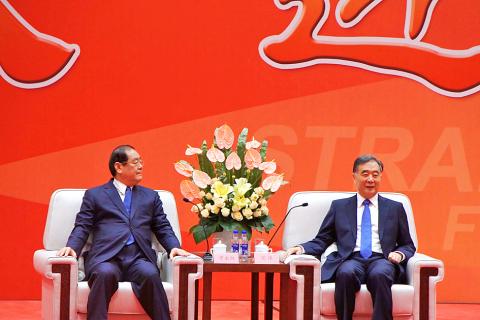Chinese Nationalist Party (KMT) Vice Chairman Tseng Yung-chuan (曾永權) and Chinese People’s Political Consultative Conference Chairman Wang Yang (汪洋) yesterday called for increased cross-strait collaborations based on the so-called “1992 consensus” and opposition to Taiwanese independence.
In the opening speech at the 11th Straits Forum in China’s Xiamen, Wang, who is also on the Standing Committee of the Chinese Communist Party’s (CCP) politburo, said that “China’s sovereignty and territory have never been severed,” adding: “Nothing has ever changed the legal fact and history that both sides of the [Taiwan] Strait belong to ‘one China.’”
People on both sides of the Strait have always longed for an end to cross-strait political opposition and desired national unification, he said.

Photo: CNA
“The nation must be unified and will definitely be unified,” he added.
Based on the conditions of the “1992 consensus” and opposition to Taiwanese independence, “we are willing to have in-depth discussions with political parties, organizations and people in Taiwan on a broad range of subjects, so that we can find common ground, build consensus and gradually move toward the goal of a peaceful unification,” Wang said.
He also called on Taiwanese to build a mutually complementary economy with China, instead of seeking economic collaboration with other countries.
Tseng, who led a 15-member KMT delegation to the event, accused President Tsai Ing-wen’s (蔡英文) administration of trying to malign the “1992 consensus,” interfering with cross-strait exchanges and promoting sensationalism over related issues.
Through last year’s nine-in-one elections, Taiwanese have expressed their desire for stable cross-strait relations free of interference based on political ideologies, he said.
The “1992 consensus” helps ensure cross-strait peace and stability like a ballast stone, and “should definitely be cherished and insisted upon,” Tseng added.
The “1992 consensus,” a term former Mainland Affairs Council chairman Su Chi (蘇起) in 2006 admitted making up in 2000, refers to a tacit understanding between the KMT and the Chinese government that both sides of the Taiwan Strait acknowledge that there is only “one China,” with each side having its own interpretation of what “China” means.
To improve cross-strait exchanges, Tseng urged China to consistently carry out the Economic Cooperation Framework Agreement signed in 2010, as well as the mechanisms for purchasing Taiwan’s surplus agricultural products.
Tseng expressed hope that authorities would maintain the number of Chinese students and tourists visiting Taiwan at a certain level to deepen “this most direct and sincere form of [cross-strait] exchanges.”
The KMT “will work to promote cross-strait exchanges and maintain peace across the Strait based on the foundation of the ‘1992 consensus’ and opposing Taiwanese independence,” he said.
Before the forum, Wang told Tseng in a meeting that Taiwanese authorities have been trying to block cross-strait economic and civic exchanges due to next year’s legislative and presidential elections.
However, despite the interference, more than 10,000 Taiwanese have attended the event, the highest number ever, he said.
Tseng said that as the elections near, the “1992 consensus” is likely to be reviewed and challenged.
“As a result, the KMT and the CCP must be prepared for difficult challenges in the next six months,” he said.
Mainland Affairs Council spokesperson Chiu Chui-cheng (邱垂正) on Thursday said that the Chinese government inflated the number of Taiwanese attending the event.

Alain Robert, known as the "French Spider-Man," praised Alex Honnold as exceptionally well-prepared after the US climber completed a free solo ascent of Taipei 101 yesterday. Robert said Honnold's ascent of the 508m-tall skyscraper in just more than one-and-a-half hours without using safety ropes or equipment was a remarkable achievement. "This is my life," he said in an interview conducted in French, adding that he liked the feeling of being "on the edge of danger." The 63-year-old Frenchman climbed Taipei 101 using ropes in December 2004, taking about four hours to reach the top. On a one-to-10 scale of difficulty, Robert said Taipei 101

Nipah virus infection is to be officially listed as a category 5 notifiable infectious disease in Taiwan in March, while clinical treatment guidelines are being formulated, the Centers for Disease Control (CDC) said yesterday. With Nipah infections being reported in other countries and considering its relatively high fatality rate, the centers on Jan. 16 announced that it would be listed as a notifiable infectious disease to bolster the nation’s systematic early warning system and increase public awareness, the CDC said. Bangladesh reported four fatal cases last year in separate districts, with three linked to raw date palm sap consumption, CDC Epidemic Intelligence

Taiwanese and US defense groups are collaborating to introduce deployable, semi-autonomous manufacturing systems for drones and components in a boost to the nation’s supply chain resilience. Taiwan’s G-Tech Optroelectronics Corp subsidiary GTOC and the US’ Aerkomm Inc on Friday announced an agreement with fellow US-based Firestorm Lab to adopt the latter’s xCell, a technology featuring 3D printers fitted in 6.1m container units. The systems enable aerial platforms and parts to be produced in high volumes from dispersed nodes capable of rapid redeployment, to minimize the risk of enemy strikes and to meet field requirements, they said. Firestorm chief technology officer Ian Muceus said

MORE FALL: An investigation into one of Xi’s key cronies, part of a broader ‘anti-corruption’ drive, indicates that he might have a deep distrust in the military, an expert said China’s latest military purge underscores systemic risks in its shift from collective leadership to sole rule under Chinese President Xi Jinping (習近平), and could disrupt its chain of command and military capabilities, a national security official said yesterday. If decisionmaking within the Chinese Communist Party has become “irrational” under one-man rule, the Taiwan Strait and the regional situation must be approached with extreme caution, given unforeseen risks, they added. The anonymous official made the remarks as China’s Central Military Commission Vice Chairman Zhang Youxia (張又俠) and Joint Staff Department Chief of Staff Liu Zhenli (劉振立) were reportedly being investigated for suspected “serious